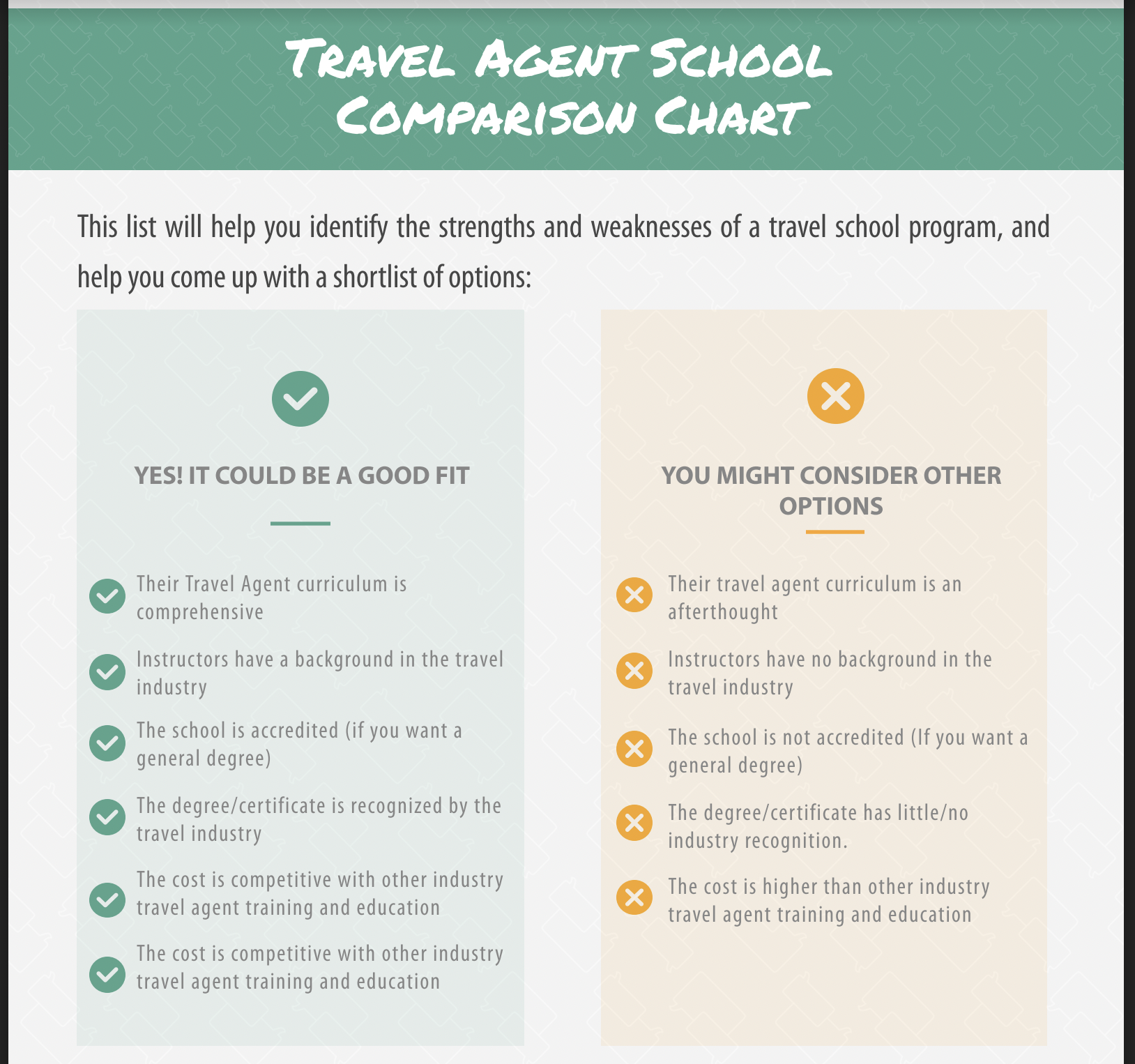Are you passionate about travel? Do you have a knack for planning itineraries and helping others create unforgettable experiences? If so, becoming a travel agent might be the perfect career move for you! However, one of the first questions that comes to mind is: What is the cost of travel agent school? In this article, we will delve into the costs associated with travel agent schools, the different programs available, and tips to help you on your journey to becoming a reliable travel professional.
The Importance of Travel Agent Education
Travel agents play a vital role in the tourism industry, helping clients navigate the complex world of travel planning. As I embarked on my own journey as a travel agent, I quickly realized that having formal education not only enhanced my knowledge but also built credibility with clients. Whether it’s learning about various destinations or understanding travel regulations, education is paramount. Below, we’ll explore the costs involved in travel agent training and education.
Travel Agent School Costs: An Overview
The cost of travel agent school can vary significantly based on the type of program you choose. Here’s a breakdown of the different types of educational paths and their associated costs:
1. Online Courses
Online travel agent courses are becoming increasingly popular due to their flexibility and affordability. Many programs offer comprehensive training without the need to attend in-person classes.
| Program | Duration | Cost | Features |
|---|---|---|---|
| Travel Agent Training Academy | 6-12 months | $395 | Certification upon completion, access to job boards |
| International Air Transport Association (IATA) | Variable | $600 – $1,200 | Industry-recognized certification |
| TA Academy | 3-6 months | $299 | Interactive training modules, marketing support |
2. Community College Programs
Many community colleges offer travel and tourism programs that provide a more in-depth understanding of the industry. Prices can vary, but you can expect to pay:
| Program | Duration | Cost | Features |
|---|---|---|---|
| Associate Degree in Travel and Tourism | 2 years | $5,000 – $10,000 | Hands-on training, internships available |
| Certificate in Travel and Tourism | 1 year | $3,000 – $6,000 | Expert-led courses, networking opportunities |
3. Online University Degree Programs
For those looking for a more comprehensive education, online universities offer bachelor’s degrees in travel and tourism management. While these programs are more extensive, they can provide a deeper understanding of the business aspects of travel.
| Program | Duration | Cost | Features |
|---|---|---|---|
| Bachelor’s Degree in Hospitality Management | 4 years | $30,000 – $60,000 | Internships, comprehensive management training |
| Online Bachelor’s in Travel and Tourism | 4 years | $25,000 – $50,000 | Flexible scheduling, global industry insights |

Additional Expenses to Consider
When considering the cost of travel agent school, it’s essential to factor in additional expenses that may arise, including:
- Books and Materials: Depending on the program, you may need to purchase textbooks or online materials, which can range from $100 to $1,000.
- Technology Requirements: Ensure you have a reliable computer and internet access; this could mean an additional investment of $500 or more.
- Certification Fees: Certification exams may impose additional fees, typically ranging from $100 to $300.
- Networking Events and Conferences: Attending industry events can facilitate important connections, costing anywhere from $50 to $500 per event.
Funding Your Education
Paying for travel agent school doesn’t have to be a daunting task. Here are some options to help fund your education:
1. Scholarships and Grants
Look for scholarships specifically aimed at students in the travel and tourism field. Websites like Fastweb and Cappex can help you find opportunities.

2. Payment Plans
Many schools offer payment plans, allowing students to pay tuition in installments rather than all at once, which can ease financial burdens.
3. Student Loans
If necessary, consider federal or private student loans. Be sure to research options to find the best rates and repayment terms.

Pros and Cons of Travel Agent School
Pros
- Gaining essential knowledge and skills.
- Improved job prospects and earning potential.
- Access to networking opportunities within the industry.
- Certification can increase credibility and trust with clients.
Cons
- Tuition costs can be significant, depending on the program.
- Not all travel agents require formal education.
- Some programs may not provide adequate real-world experience.

Real Experiences: Lessons Learned in Travel Training
Reflecting on my journey through travel agent school, I remember the excitement but also the challenges that came with it. One particular instance involved a group project where we planned a trip to Europe. Each member had a different destination, and collaboratively, we created an unforgettable itinerary that blended culture, cuisine, and unique experiences.
This not only enhanced my planning skills but also improved my ability to work in a team—a crucial element in the travel industry. I also learned the importance of understanding clients’ needs, which aided me greatly when I began working with clients on my own.
Destination Highlights for Aspiring Travel Agents
As a travel agent, having firsthand experience with various destinations can dramatically enhance your credibility and recommendations. Here are some highlights of popular travel destinations you might consider exploring:
1. Paris, France
Known as the “City of Light,” Paris is a must-see for anyone in the travel industry. From the Louvre to the Eiffel Tower, there’s no shortage of iconic sites. My experience at a quaint café near Montmartre not only inspired my love for French culture but also gave me valuable insights into planning romantic getaways.

2. Bali, Indonesia
This tropical paradise is famous for its stunning beaches and rich cultural heritage. I had an incredible time exploring the rice terraces and experiencing traditional Balinese ceremonies, which deepened my understanding of wellness tourism trends.
3. Tokyo, Japan
The blend of tradition and modernity in Tokyo is fascinating. From bustling street markets to serene temples, my journey there taught me the importance of catering itineraries to diverse interests.

Top Rated Travel Agent Schools
When considering travel agent school, it’s crucial to choose a program that fits your career goals. Below are some of the highest-rated schools with student reviews to help you make an informed decision:
1. Penn Foster
Rating: 4.5/5
Overview: An affordable online program that covers essential travel topics with flexible scheduling.
Reviews: “Great value for money and easy to follow!” – Sarah A.
2. The Travel Institute
Rating: 4.7/5
Overview: Recognized for its comprehensive curriculum and certification options.
Reviews: “I learned so much in a short period, and the certification really helped boost my confidence.” – Mark B.

3. International Air Transport Association (IATA)
Rating: 4.6/5
Overview: Offers globally recognized certifications with in-depth analysis of travel regulations and ticketing.
Reviews: “Challenging but rewarding program. It opened new doors for my career!” – Emily R.
Frequently Asked Questions about Travel Agent Schools
1. What is the average cost of travel agent school?
The average cost varies significantly, averaging between $300 for online courses to $50,000 for degree programs. Factors affecting costs include institution type and program length.
2. Do I need a degree to become a travel agent?
No, a degree isn’t strictly necessary. However, completing a program can enhance your knowledge, skills, and credibility.
3. How long does it take to become a certified travel agent?
Certification programs can take anywhere from a few months to a couple of years, depending on the type of program and the pace of learning.
Conclusion: Investing in Your Travel Career
Investing in travel agent school is an invaluable step for anyone looking to build a successful career in the travel industry. With various programs available, understanding the associated costs and benefits is crucial in making an informed decision. Remember, your passion for travel is your greatest asset, and with the right education and experience, you can turn that passion into a fulfilling career. Wherever you decide to study, embrace the journey and let your love for travel shine through!